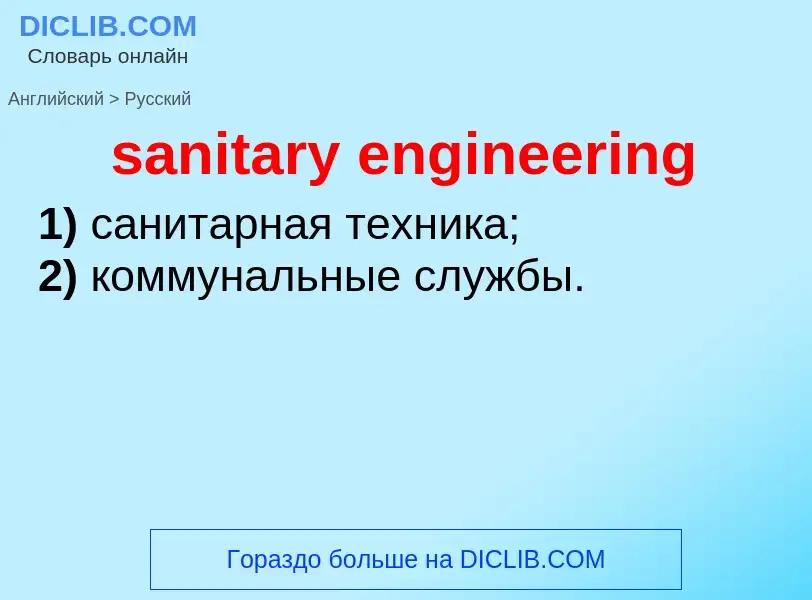Μετάφραση και ανάλυση λέξεων από την τεχνητή νοημοσύνη ChatGPT
Σε αυτήν τη σελίδα μπορείτε να λάβετε μια λεπτομερή ανάλυση μιας λέξης ή μιας φράσης, η οποία δημιουργήθηκε χρησιμοποιώντας το ChatGPT, την καλύτερη τεχνολογία τεχνητής νοημοσύνης μέχρι σήμερα:
- πώς χρησιμοποιείται η λέξη
- συχνότητα χρήσης
- χρησιμοποιείται πιο συχνά στον προφορικό ή γραπτό λόγο
- επιλογές μετάφρασης λέξεων
- παραδείγματα χρήσης (πολλές φράσεις με μετάφραση)
- ετυμολογία
sanitary engineering - translation to ρωσικά
['sænit(ə)riendʒi'ni(ə)riŋ]
общая лексика
санитарная техника
сантехника
коммунальные службы (водопровод, канализация и т. п.)
сантехнический
строительное дело
санитарная техника (охватывает системы водоснабжения, канализации и мусороудаления)
Ορισμός
)
Βικιπαίδεια

Sanitary engineering, also known as public health engineering or wastewater engineering, is the application of engineering methods to improve sanitation of human communities, primarily by providing the removal and disposal of human waste, and in addition to the supply of safe potable water. Traditionally a branch of civil engineering and now a subset of environmental engineering, in the mid-19th century, the discipline concentrated on the reduction of disease, then thought to be caused by miasma. This was accomplished mainly by the collection and segregation of sewerage flow in London specifically, and Great Britain generally. These and later regulatory improvements were reported in the United States as early as 1865.
It is also concerned with environmental factors that do not have an immediate and clearly understood effect on public health. Areas outside the purview of sanitary engineering include aesthetic concerns such as landscaping, and environmental conservation as it pertains to plants and animals.
Skills within this field are usually employed for the primary goal of disease prevention within human beings by assuring a supply of healthy drinking water, treatment of waste water, and removal of garbage from inhabited areas.
Compared to (for example) electrical engineering or mechanical engineering which are concerned primarily with closed systems, sanitary engineering is a very interdisciplinary field which may involve such elements as plumbing, fire protection, hydraulics, life safety, constructive modelling, information technology, project design, microbiology, pathology and the many divisions within environmental science and environmental technology. In some cases, considerations that fall within the field of social sciences and urban planning must be factored in as well.
Although sanitary engineering may be most associated with the design of sewers, sewage treatment and wastewater treatment facilities, recycling centers, public landfills and other things which are constructed, the term applies equally to a plan of action to reverse the effects of water pollution or soil contamination in a specific area.


